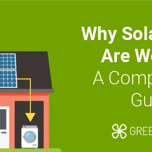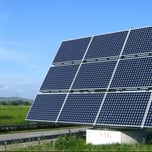Answer these simple questions and we will find you the BEST prices
Which type of solar quotes do you need?
It only takes 30 seconds
100% free with no obligation

Get up to 4 quotes by filling in only 1 quick form

Slash your energy bills by installing solar panels

For the average 2-3 bedroom house
- GreenMatch
- Blog
- Pros & Cons of Solar Energy – v2
17 Advantages & Disadvantages of Solar Energy (October 2025)

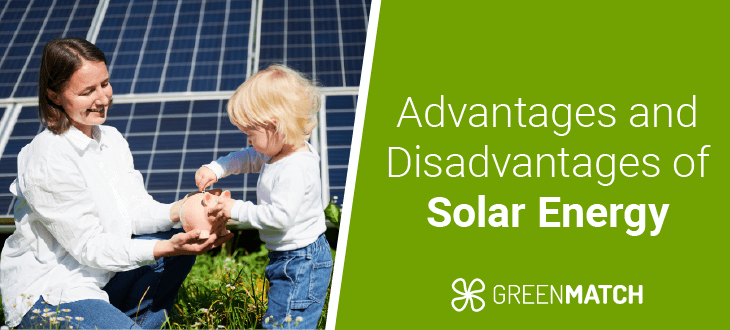
- Slash your energy bills by up to £1,567 by installing solar panels.
- By installing a solar panel system of 4kW for an average 2 - 3 bedroom house, you can expect to break even on your investment in about 14 years. You will also have a return on investment amounting to £6,500 – £7,500.
- Reduce your carbon footprint by up to 1 tonne of CO2 per year and up to 25 tonnes over the 25-year lifespan of your solar panels.
- Solar panels can increase your property value by about 4.1%. This translates to roughly £9,500 for average UK homes.
Did you know that the energy the sun provides to the earth for one hour could meet the global energy needs for one year? Undoubtedly, the sun is a powerful energy source, and even though we are not able to collect a fraction of this energy, harnessing this power by installing solar panels can make a significant difference to the planet.
While it has been widely criticised for being expensive or inefficient, solar energy has now proved to be extremely beneficial – not only for the environment but also for the private economy. It can save you up to £1,567 on your energy bills annually and can increase your property value. But there’s much more to it than that, so let’s dive into the advantages and disadvantages of solar energy in this article.
Already convinced solar is right for you? Skip the hassle! Finding qualified installers on your own can take up hours of your precious time, but GreenMatch can help. Just like thousands of happy homeowners, save money and go green with GreenMatch. Get up to 4 free, no-obligation quotes from pre-vetted installers in your area. Click the button below to get started today!
- Quotes from local engineers
- Payment by finance available
- Save up to £1,567 per year
It only takes 30 seconds



What are the advantages and disadvantages of solar energy?
Thanks to available solar panel grants, as well as the increasingly competitive prices in the market, solar energy has become the main source of energy for more and more families. The technology has drastically improved in recent years and has been complemented by solar battery storage systems, turning solar into a significantly more efficient source of clean energy. However, solar battery prices are something worth thinking about.
With this being said, it's important to keep in mind that there are always pros and cons no matter the energy source you choose to analyse. GreenMatch has outlined the key advantages and disadvantages of solar energy in the following points:
| Advantages of Solar Energy | Disadvantages of Solar Energy |
|---|---|
| Renewable energy source | Associated with pollution |
| Reduces electricity bills | High upfront cost |
| Increased energy independence | Performance is dependent on sunlight |
| Low maintenance costs | Solar energy storage is expensive |
| Easy to scale up your system size | Low efficiency rating |
| Increases your property value | Fixed at their installed location |
| Diverse applications | Uses a lot of space |
| Technology development | Solar panel aesthetics |
| Long product lifespan | |
| Solar panel funding options |

What are the advantages of solar energy?
There are many benefits of using solar energy to power your home. These include:
- It’s a renewable energy source, meaning that it can last forever (as long as we have the sun!).
- It doesn’t require the mining of fossil fuels. It’s clean and pollution free: no carbon emissions and no greenhouse gases.
- It can reduce your energy bills. Solar energy is free and can be stored in a battery to maximise use.
- Solar panels require little to no maintenance, saving you time and money.
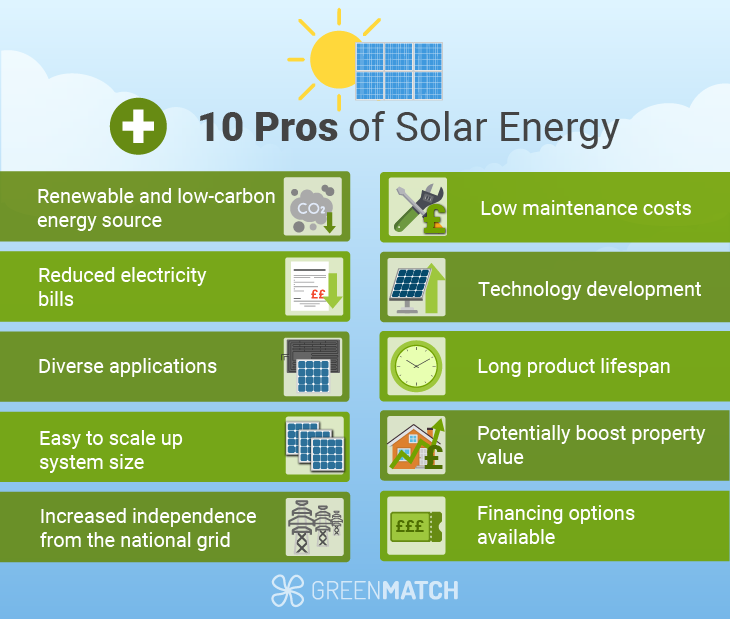
In the sections below, we’ll discuss all of the advantages you can benefit from in more detail.
1. Renewable energy source
Among all the benefits of solar energy and panels, the most important thing is that solar energy is a truly renewable energy source. It can be harnessed in all areas of the world and is available every day. We cannot run out of solar energy, unlike some other sources of energy, such as oil and natural gas.
Solar energy will be accessible as long as we have the sun. Therefore, sunlight will be available to us for at least 5 billion years, according to scientists.
Solar energy is also completely free and doesn't generate carbon dioxide. You can save approximately 1 tonne of carbon dioxide per year, meaning one installation can offset 25 tonnes of carbon dioxide over its lifetime. By installing solar panels you make your home more eco friendly and do your bit for the environment.
2. Reduces electricity bills
With a solar system, you'll be generating your own clean electricity, leading to substantial savings on your monthly energy costs. How much you save on your bill will be dependent on the size of the solar system and your electricity or heat usage. For example, if you are a business using commercial solar panels this switch can have huge benefits because the large system size can cover large chunks of your energy bills.
Below you can find an overview of the estimated yearly savings you can expect from domestic solar panels per home and system size:
| Household Size | Solar System Size Required | Estimated Annual Savings |
|---|---|---|
| 1 - 2 bedrooms | 3kW | £440 |
| 2 - 3 bedrooms | 4kW | £660 |
| 4 - 5 bedrooms | 6kW | £1,005 |
Since your electricity bills will be reduced, this means you'll be able to make up for the upfront costs over time (and likely even profit from your panels in the longer term!). You can find the most up-to-date information in our 'is it worth getting solar panels?' guide.
3. Increased energy independence from the National Grid
One of the main benefits of solar energy is that you don't have to rely on the National Grid for electricity. Therefore, if the grid is down during daylight hours, this won't affect your home as you'll still be able to produce electricity from your solar panels.
If you install a solar battery alongside your solar panels, this independence will be even greater. A solar battery enables you to store any excess energy you don't use during the day. You can then save it for when it's dark outside, so you won't have to rely on the grid at nighttime either.
4. Low maintenance costs
Solar energy systems generally don’t require a lot of maintenance. You only need to keep them relatively clean, and rainwater is usually enough to get rid of normal levels of dust and grime. If in doubt, you can always rely on specialised cleaning companies, which typically offer their services from around £25-£35.
Most reliable solar panel manufacturers offer a 25-30 years warranty. So, if something does unexpectedly go wrong with your solar panels, then there's a good chance you're covered! You should always check the terms and conditions of your warranty with the supplier beforehand.
Also, as there are no moving parts, there is no wear and tear. The inverter is usually the only part that needs to be changed after 10-15 years because it is continuously working to convert solar energy into electricity and heat (solar PV vs. solar thermal). Apart from the inverter, the cables also need maintenance to ensure your solar power system runs at maximum efficiency.
So, after covering the initial cost of the solar system, you can expect very little spending on maintenance and repair work. And can sleep easy knowing your solar panels are working just fine.
5. Easy to scale up your system size
If your electricity needs have changed, for example because of an extension to your home or additional family members, you may need a larger solar system to support this. As long as you have enough roof space, it's easy to add more solar panels to your system and increase its kW size.
So, if you wish to be conservative in your household's energy requirement estimations when you first install your panels, this isn't a problem as you can always add more later.
6. Increases your property value
As you can see, there are many advantages to solar energy. This makes having solar panels on your property very attractive to potential buyers and so can increase your home's property value. On average, solar panels can increase your home’s value by about 4.1%, which translates into about £9,500.
The size of your solar system will affect how much the value will increase. The bigger the solar system, the more value it can add to your property.
7. Diverse applications
Solar energy can be used for diverse purposes. You can generate electricity (photovoltaics) or heat (solar thermal). Solar energy can be used to produce electricity in areas without access to the electricity grid, to distil water in regions with limited clean water supplies, and to power satellites in space.
Solar energy can also be integrated into the materials used for buildings. Not long ago, the company Sharp introduced transparent solar energy windows.
8. Technology development
Technology in the solar power industry is constantly advancing and improvements will intensify in the future. Innovations in quantum physics and nanotechnology can potentially increase the effectiveness of solar panels and double, or even triple, the electrical input of the solar power systems. This also means for homeowners that solar panels are becoming more affordable as technology develops.
9. Long product lifespan
So, not only will solar energy from the sun last us for billions of years to come, but your solar panels can also last for 25–30 years. This is a comparatively good lifespan compared to appliances such as boilers and heat pumps.
On top of this, many popular solar panel manufacturers offer warranties of 25-30 years, so you can feel secure knowing that your panels are covered for the majority of their lifespan.
10. Solar panel funding options
If the main factor holding you back from installing solar panels is the cost, there is a solution. In the UK, there are plenty of solar panel grants and schemes available to help you with the costs of solar panels.
For example, through schemes such as the Smart Export Guarantee in Great Britain you can sell your excess energy back to the National Grid. This means none of your energy will be wasted and by selling it you will also reduce your payback period.
Home Energy Scotland also provides grants and interest free loans on renewable energy systems, including solar systems. This can reach up to £6,000 for PV panels and £5,000 for solar water heating systems, which can significantly help you with the upfront costs.
Furthermore, VAT has been reduced to 0% on energy efficient systems in the UK. As a result, average homes can expect to save about £2,300 on installation costs. This measure began in April 2022 and will last until 2027.
Don’t want to wait any longer to reap all of these solar benefits? By opting for solar panels, you’re not only reducing your energy costs, but you’re also making a positive impact on the environment. This is all well and good, but where do you find qualified solar installers for a competitive price?
Researching and contacting installers individually can eat into hours or even days of your free time. Thankfully, our team at GreenMatch offers an alternative solution and can help you take the first step by securing the best quotes for your needs.
By filling out our form now you’ll receive up to 4 free quotes from trusted local installers and begin your journey towards a brighter, more sustainable future in less than a minute. Say goodbye to hours spent vetting and requesting quotes from installers in your area.
This service is completely free and without obligation. Click the button below to get your free quotes now.
- Quotes from local engineers
- Payment by finance available
- Save up to £1,567 per year
It only takes 30 seconds



Disadvantages of solar energy
1. Associated with pollution
Although pollution related to solar energy systems is far less compared to other sources of energy, it is still something you should be aware of. Both transportation and installation of solar systems have been associated with the emission of greenhouse gases.
There are also some toxic materials and hazardous products used during the manufacturing process of solar photovoltaic systems, which can indirectly affect the environment.
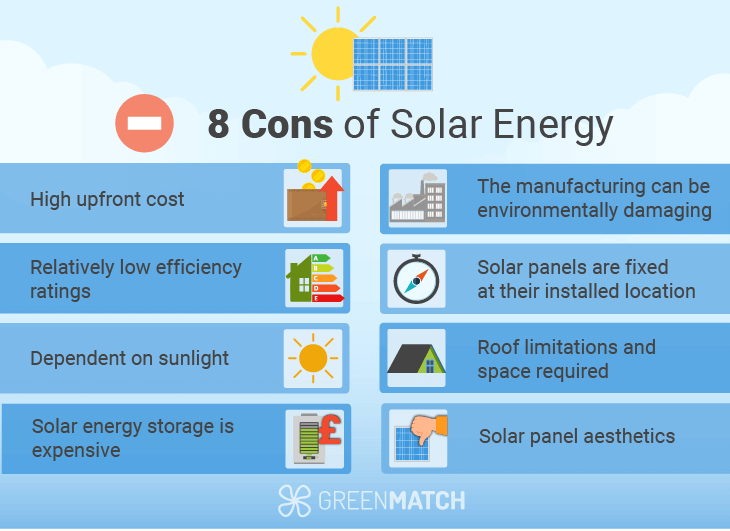
Nevertheless, solar panels do not produce air pollution or greenhouse gases when operating, and solar energy pollutes far less than alternative energy sources.
2. High upfront cost
The initial cost of solar panels is fairly high. This includes paying for solar panels, an inverter, batteries, wiring, and the installation labour costs. Nevertheless, solar technologies are constantly developing, so it is safe to assume that prices will go down in the future.
However, despite the high upfront costs, there are many other areas of cost that you'll save in. As mentioned previously, you'll save on your energy bills, maintenance costs are almost non-existent, and there are grants and schemes available to support you. You'll not only be able to make back the upfront costs but you'll also be able to profit from your solar panels.
Take a look at the table below to get an idea of how much you’ll save, when you’ll break even on your expenses, and what your return on investment can be depending on the solar system size you opt for:
| Solar System Size | Initial Cost | Estimated Annual Savings | Break-Even Point | Return on Investment |
|---|---|---|---|---|
| 3kW | £7,000 - £8,000 | £440 | 17 years | £3,000 – £4,000 |
| 4kW | £9,000 - £10,000 | £660 | 14 years | £6,500 – £7,500 |
| 6kW | £12,000 - £13,000 | £1,005 | 12 years | £12,125 – £13,125 |
3. Performance is dependent on sunlight
Solar panels are dependent on sunlight to effectively gather solar energy. Therefore, although solar energy can still be collected during cloudy and rainy days, the efficiency of the solar system drops. You should also take into account that solar energy cannot be collected during the night. Not even big system sizes like a 12kW solar system can collect solar energy at night.

With that being said, your solar panels will still work all year round and shouldn't be affected by UK temperatures. And if you experience snow, this can actually increase your solar panels functionality by reflecting even more light on them.
Additionally, if you also require your water heating solution to work at night or during wintertime, thermodynamic panels are an alternative to consider.
For a breakdown of how effective solar panels are in the winter, check out our video.
4. Solar energy storage is expensive
Solar energy has to be used right away, or alternatively, it can be stored in large batteries. These batteries, often used in off-the-grid solar systems, can be charged during the day so that the energy is used at night. This is a good solution for using solar energy all day long but the upfront costs of the battery are also quite expensive.
Whether a solar battery is worth it or not will depend on your individual situation, but either way you won't need one or you'll benefit from it in the long term. And luckily your energy demand is usually higher during the day so you can meet most of your energy needs directly from your solar panels.
5. Low efficiency rating
Solar panels typically only have efficiency ratings between 15-20%. This means that about 80% of the solar energy hitting the panels is not being converted into electricity.
Despite these less-than-ideal looking numbers, it shouldn't actually be a big issue for your home.
Considering solar energy is completely free and will last for billions of years, you won't be losing any money due to the inefficiency (unlike if you had, for example, an old inefficient gas boiler). Furthermore, homeowners with solar panels are ultimately meeting most of their energy needs and saving money.
6. Fixed at their installed location
De-wiring and unmounting your solar system from your roof is inconvenient and costs more money than it's worth. Therefore, if you move house, you're likely to leave your solar panels behind and will no longer be able to benefit from their free electricity.
However, as mentioned earlier, having solar panels can increase your home's resale value, so you may still be able to make your money back or even a profit.
7. Solar panel aesthetics
This point is subjective, as many people don't mind, or even like, the aesthetics of solar panels. However, some people do see solar panels as an eyesore or prefer for homes in certain neighbourhoods to look a specific way, so this may be a discussion to have with your neighbours or local council.
If the aesthetics of your solar panels are important to you or your neighbours, you don't need to worry, as there are more aesthetically pleasing options available. Some companies offer solar roof tiles which blend into the roof more and therefore, won't disrupt your home's style.
8. Uses a lot of space
The more electricity you want to produce, the more solar panels you will need, as you want to collect as much sunlight as possible. Solar PV panels require a lot of space and some roofs are not big enough to fit the number of solar panels that you would like to have. Some roofs also have obstacles like windows that could influence how much solar panels you can install. This problem occurs less with solar panels for flat roofs in the UK.
An alternative is to install some of the panels in your garden but they need to have access to sunlight. If you don’t have the space for all the panels that you wanted, you can opt for installing fewer to still satisfy some of your energy needs.
Make the transition to solar energy today!
As you can see, there are many advantages and disadvantages of solar energy to weigh up against each other to help you decide if solar panels are the right choice for your home.
However, finding qualified installers who offer the best prices isn't always easy. Researching and contacting solar panel installers one by one can take up hours or even days of your precious free time. Thankfully, it doesn't have to be this way: GreenMatch can help you find the best solar panel deals fast and completely free of charge.
By simply filling in our short form, we can provide you with up to 4 quotes from our extensive network of qualified and trusted solar panel installers. This way, you can easily compare prices and select the best one, saving you both time and money. Our service is completely free and non-binding. Click the button below to fill in our 30-second form and get your free quotes now.
- Quotes from local engineers
- Payment by finance available
- Save up to £1,567 per year
It only takes 30 seconds



FAQ
There are many advantages to solar energy including: (1) reduced electricity bills, (2) low maintenance costs, (3) it’s a renewable energy source, (4) more energy independence from the grid, and (5) available solar panel funding options.
There are also 5 disadvantages of solar energy to consider: (1) high upfront cost, (2) the manufacturing processing is associated with pollution, (3) performance is dependent on sunlight, (4) uses a lot of space, and (5) cost of solar energy storage.
There are many benefits to solar energy, however, there are also some negative effects to be aware of. Namely, pollution associated with the manufacturing process of solar systems. Some toxic materials and hazardous products are used during this process which can indirectly have a negative effect on the environment.
The British weather can lower the efficiency of solar panels. This is because solar panels are dependent on sunlight and the UK has many overcast days during the year. Solar panels can still generate electricity on overcast days and are still considered to be a worthwhile investment, however, they won’t generate as much energy compared to sunny days.
There are many uses of solar energy, however, the 5 most common uses include: solar electricity, solar water heating, solar heating, solar ventilation and solar lighting. It is advised to weigh up both the pros and cons of solar energy to find out if it is the best energy source for you or not.

Brontë is an experienced writer and editor for GreenMatch. Her passion for sustainability and renewable energy drives her to stay at the forefront of green-energy trends.
We strive to connect our customers with the right product and supplier. Would you like to be part of GreenMatch?




